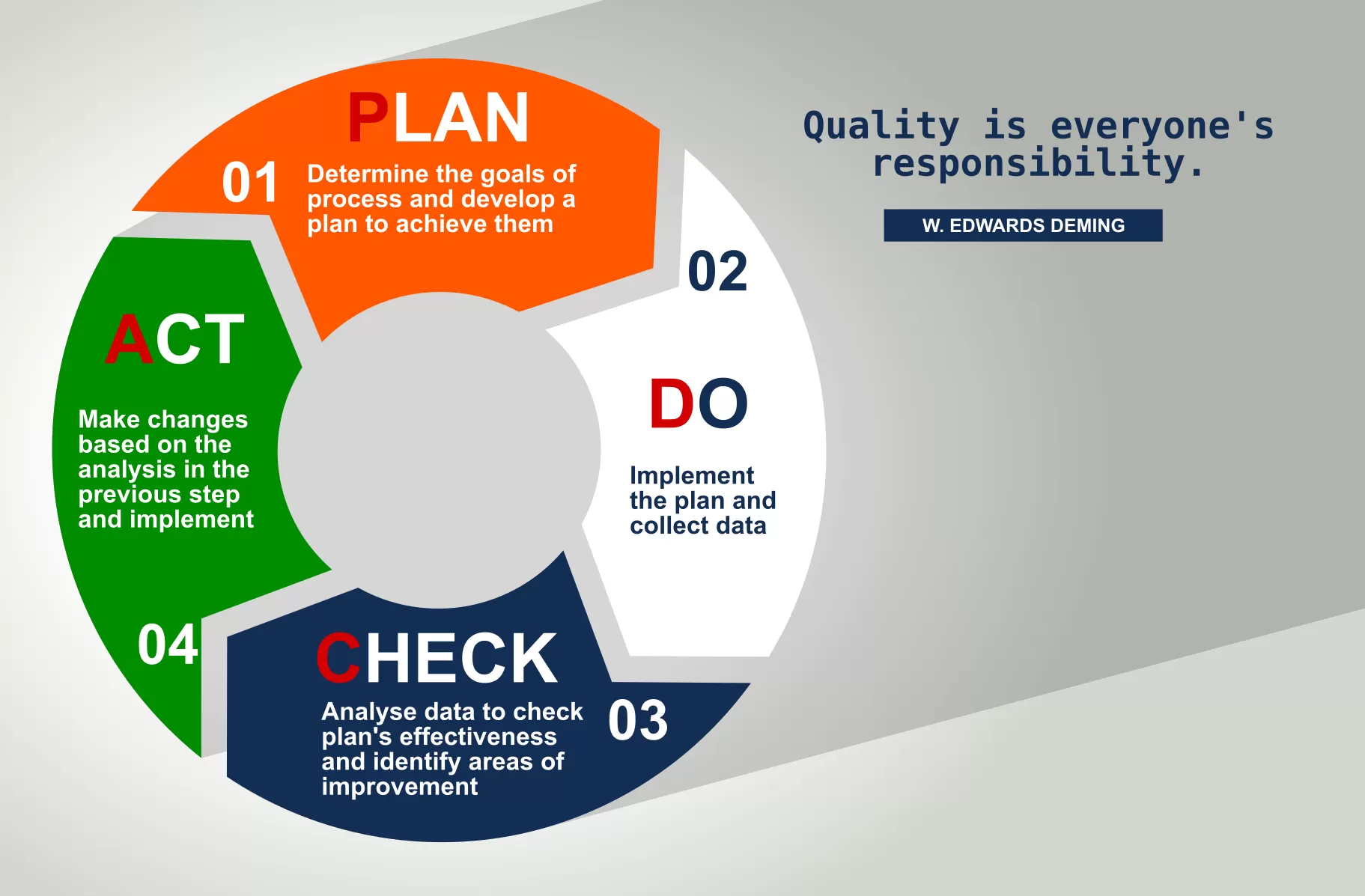Welcome to the world of quality, a vital, make-or-break factor for any business. To stay ahead, companies must constantly refine their products and strive for excellence. But how do they achieve this continuous improvement? Enter the Deming Cycle, also known as PDCA (Plan-Do-Check-Act). Created by the renowned W. Edwards Deming, this proven methodology is a strategic four-step process used by companies around the world to improve performance and increase quality. This article breaks down the nuts and bolts of this practical approach. We'll examine each stage of the cycle, show you how to apply it, and demonstrate how mastering it can improve your organisation's quality performance. So let's start spinning the Deming Cycle, watch it work its magic, and empower your organisation to reach new heights of excellence!
What is the Deming Cycle?
Completing the Deming Cycle involves a rhythmic progression through four critical steps - Plan, Do, Check and Act - each designed to systematically improve product, service or operational quality.
Plan: The process begins with the Plan stage. Organisations first identify the problem they are trying to solve. They set specific, measurable, achievable, relevant and time-bound (SMART) goals and develop a comprehensive strategy to achieve them. This stage requires thorough research and critical thinking to outline a detailed plan of action, laying the foundation for subsequent steps.
Do: Next comes the 'Do' stage, where plans are translated into action. Organisations roll up their sleeves and get to work, making progress towards their goals. It's important to keep lines of communication open and ensure that everyone understands their role and the overall goal. Mastering this stage will ensure the plan is executed seamlessly, paving the way for potential quality improvements.
Review: The review stage is a reflective pause in the cycle. This is where companies examine the results of their actions, collect and analyse relevant data, and measure their progress against the goals set in the planning phase. It's an opportunity to spot variances, identify bottlenecks and understand performance gaps. Once this stage is mastered, organisations can cultivate a data-driven mindset, which is essential for sustainable quality improvement.
Act: In the Act stage, organisations use the insights they have gained to make informed decisions. Based on their findings, they may refine the plan, move forward, or start the cycle again. This step reinforces the continuous nature of improvement embodied in the Deming Cycle. By completing this stage, companies can foster an environment of continuous learning and improvement that will contribute significantly to their overall quality performance.
Why is the PDCA cycle so effective in achieving excellence?
Designed as a continuous cycle, each iteration reinforces the lessons learned from the previous one and contributes to the relentless pursuit of quality. Its widespread use in Total Quality Management (TQM), Six Sigma and Lean management methodologies testifies to its effectiveness as a leading quality and performance management tool.
Because of its iterative nature, the Deming Cycle is a beacon for continuous improvement. By using this process, organisations can achieve a number of benefits:
Identify and correct problems while capitalising on opportunities.
Set clear goals and objectives that align with the organisation's mission.
Design and implement strategic plans to achieve these goals.
Collect and analyse data to measure results and insights.
Use this information to make informed decisions and take decisive action.
Consistent application of the Deming Cycle drives organisations to excellence and enables them to instil a culture of continuous improvement in products, services and processes. This ability to foster a culture of continuous improvement is the key benefit of the Deming Cycle - an essential quality for organisations seeking to remain competitive in today's dynamic business environment. It emphasises the importance of customer focus and employee involvement as critical elements in mastering quality. By actively involving customers and employees in the process, organisations can gain invaluable insight into the needs and preferences of their stakeholders, enabling them to make informed decisions that improve their products and processes.
How can organisations implement the Deming Cycle?
While implementing the Deming Cycle may seem daunting, it can be made manageable by breaking it down into digestible, smaller steps. With careful planning, clear communication and strong leadership, you can overcome challenges and make significant improvements. Factors such as organisational size, process complexity, available resources and resistance to change can all play a role. Here are some practical tips to get you started:
Identify a specific problem or opportunity you want to address.
Define clear, achievable goals for your project.
Design a strategic plan to achieve those goals.
Start implementing the plan while collecting data to evaluate the results.
Use the information you gather to make informed decisions and take action.
Repeat these steps to strive for excellence.
Remember that the PDCA cycle isn't a one-size-fits-all solution. The time it takes to implement it will depend on the specific needs of your organisation. It may take several weeks or even months to plan, execute and analyse the results of the first cycle. However, this first iteration only sets the stage - there will be subsequent rounds. Most importantly, the Deming Cycle is universal - it can be used to improve any process, product or service, and isn't limited to any particular industry or sector.
In essence, the Deming Cycle is a proven framework for mastering quality. By continually navigating its four-step process, organisations can identify and mitigate problems, set goals, create and enforce plans to achieve them, collect and analyse data to evaluate results, and use this information to make decisions and take action. This cyclical process promotes continuous improvement of products, services and processes, helping organisations to achieve excellence and cultivate a culture of continuous improvement. After all, quality is a journey, not a destination, and the Deming Cycle is a powerful compass to guide organisations along the way.




